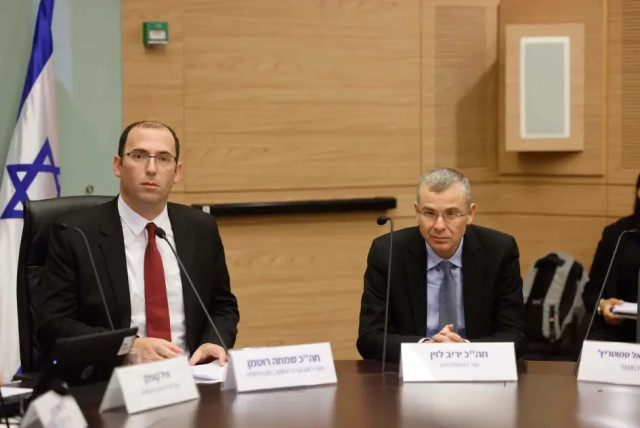Following MK opposition to new 'Rabbis Law,' Netanyahu announces bill out of daily order

Coalition to oust two Likud MKs who oppose the bill from Knesset committee dealing with the bill, which is set to pass its first hurdle in Knesset.
Following the backdrops of the announcment for a vote over the controversial law aimed at giving the coalition’s religious parties greater control over Israel’s rabbinical establishment, Prime Minister Benjamin Netanyahu stated on Wednesday that the bill was removed from the committee's daily order.
The decision to proceed with the bill, which many members of the Knesset’s coalition opposed alongside the entire opposition, came after political wrangling behind the scenes and after the coalition decided to oust two members who opposed the bill from the Knesset Constitution Committee, where the vote will be held.
The bill proposes to give Israel’s Chief Rabbinate and Religious Affairs Ministry control over appointments of government-paid municipal and neighborhood rabbis, instead of the current system where the cities themselves have the power to appoint their rabbis. The bill is widely viewed as an attempt by the coalition’s orthodox parties, especially the haredi Shas party, to appoint its members to the position, as well as gain influence over issues of religion in the state, even in secular areas.
Significant criticism
Criticism of the bill by both the opposition and coalition focused on two points: First, the fact that the bill is politically motivated and intended to grant lucrative jobs to political allies, and second, that it takes the power to appoint rabbis who are appropriate to the specific character of each city and neighborhoods away from mayors and local authority leaders, and gives it to the national government.
According to a source from Shas, the party’s chairman MK Aryeh Deri was determined to pass the bill both because of its importance to him, and as a statement to the coalition that the Likud must be committed to coalition discipline, or else the coalition will dissolve. The party later denied the charge.

Leaders of the coalition thus acted to oust the two Likud members who opposed the bill, MKs Tally Gotliv and MK Moshe Saada. However, this requires the approval of the Knesset House Committee, and at press time it was unclear how this would happen in time for the vote on Wednesday, which was scheduled for 8:30.
The two responded with harsh criticism of their coalition leaders.
Saada said in a statement that he “opposed this bad law and the bad timing in which it is brought, and no sanction or threat will change my ideological position.”
“I will not accept a situation where in wartime a bill is brought whose purpose is to create hundreds of rabbinical jobs. And as if this was not enough, due to the surrender to Shas, religious Zionists…who are endangering their lives on the field of battle will not be able to be appointed as municipal rabbis [due to Shas control]. This situation is unacceptable,” Saada said.
Gotliv wrote on X, “Likud voters, I am embarrassed that Coalition Whip Ofir Katz (Likud) is a pawn of Deri and Netanyahu, a servant of masters. You have the choice to elect brave Knesset members who work for you and not for Arye Deri and [Finance Minister and Religious Zionist Party chairman] Bezalel Smotrich, who during wartime are legislating the corrupt ‘job’s law.’ Disgusting!”
Yesh Atid chairman MK Yair Lapid said in a statement, “How far is Netanyahu willing to crawl for the haredim to maintain his coalition? How much will members of Knesset in the Likud continue to absorb for the haredim? Draft evasion. Jobs. There is no limit. Let the country burn, as long as there are more rabbis.”
A third member of the coalition who is a member of the committee is Otzma Yehudit MK Yizhak Kroyzer. Otzma Yehudit opposed the bill when it was first proposed in 2023, and repeated its opposition on Tuesday. A spokesperson for the party accused Netanyahu and Deri of cutting a “political deal” with Ra’am MK Mansour Abbas for the latter, who is also a member of the committee, not to attend Wednesday’s vote.
Including Rothman, the Knesset Constitution Committee includes 16 members, nine from the coalition and seven from the opposition. With Saada and Gotliv opposed the bill would end in a tie, and therefore another “no” vote or abstention is necessary. The spokesperson for Otzma Yehudit did not provide proof of the existence of such a deal.
The vote is a preliminary vote to send the bill to the Knesset plenum for its first reading, after which it will return to the committee for further debate.
Rothman criticized Gotliv and Saada in his opening remarks during Tuesday’s debate, saying that it was a “disgrace” that “out of all the topics to shout about, such as the slow progress in [the war in] Gaza, this is what you explode about.”
In addition to Knesset members and representatives of the rabbinate, several mayors also attended Tuesday’s debate to express their opposition to the bill. These included Likud mayors such as Modi’in mayor Haim Bibas, Dimona mayor Benny Biton, and Ashkelon mayor Tomer Glam, as well as Yesh Atid’s Herzliya mayor Yariv Fisher.
The mayors were uncharacteristically fierce in their opposition to the bill. Glam, Biton, and Bibas all raised their voices at Rothman and Shas MK Erez Malul, who is the bill’s sponsor. Glam threatened the Likud MKs, saying that if they moved forward with the bill it would bring down the government and that he would act so that whoever supported the bill would suffer for it politically.
According to Rothman, part of the bill’s purpose was to appoint rabbis to over 40 cities that currently do not have one. Bibas argued that to do so, the only necessary measure was to create a mechanism to fill these vacancies – and that all other parts of the bill were unnecessary and harmful. According to Bibas, the local authorities have carried the bulk of the governing burden since the COVID-19 pandemic, and instead of expanding their authorities, this bill would reduce them.
Rothman’s Knesset Constitution Committee was responsible for the government’s controversial judicial reform bills, and the sights in the committee on Tuesday morning resembled the highly charged debates of the judicial reforms. Opposition Knesset members repeatedly interrupted Rothman, who responded by removing them from the committee room.
Israel’s rabbinate has statutory judicial power over issues such as marital status, conversion, and burial. Some critics pointed out that at its heart, the bill’s purpose was similar to that of other judicial reform bills – to increase government control of a judicial body.
Other coalition MKs or ministers who announced their opposition were Dan Illouz (Likud), Eli Dallal (Likud), and Diaspora Affairs Minister Amichai Chikli.
Shas also issued a response to National Security Minister Itamar Ben-Gvir, saying that Shas did not make any agreement with any Arab party or any party from the opposition factions to support the Rabbis law.
"Ben-Gvir, in his devious way, spreads lies in order to blackmail Shas into accepting the appointment of rabbis he desires, or the appointment of one or another chief rabbi, contrary to the rules. This move will not work," the Haredi political party said. "Shas expects that the coalition agreement signed with it will be fulfilled, and if Ben-Gvir decides to vote against the law, the responsibility will solely be on him."
Yisrael Beytenu Chairman Avigdor Liberman criticized the coalition following the backdrop of the bill, saying "The Israeli government continues to abandon Israeli high-tech. In light of the severe state of high-tech in Israel since the war broke out and the data showing a sharp decline in the volume of foreign investments, and the barriers preventing investors from investing in Israeli startups, I convened today the Promotion of the High-Tech Industry Subcommittee under my leadership for its sixth meeting."
"It particularly bothered me to discover that while the high-tech situation is at a historic low, no representative from the coalition bothered to attend, and they were all busy with the 'jobs law' in the Constitution Committee," he added.
Removing from daily order
אחרי המחלוקות בקואליציה ודחיית ההצבעה: נתניהו הסיר את חוק "הרבנים" מסדר היום של ועדת החוקה@avishaigrinzaig pic.twitter.com/K4hJft5N4a
— כאן חדשות (@kann_news) June 18, 2024
Following the controversy concerning the bill, Prime Minister Benjamin Netanyahu decided to remove the bill from the committee's daily order, KAN news reported on Wednesday.
Maariv contributed to this article.
